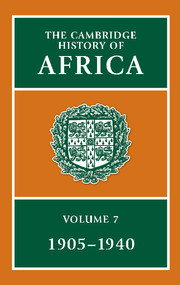Book contents
- Frontmatter
- Introduction
- 1 The imperial mind
- 2 Aspects of economic history
- 3 Christianity
- 4 Islam
- 5 African cross-currents
- 6 The Maghrib
- 7 French black Africa
- 8 British West Africa and Liberia
- 9 Belgian Africa
- 10 Portuguese Africa
- 11 Southern Africa
- 12 British Central Africa
- 13 East Africa
- 14 Ethiopia and the Horn
- 15 Egypt and the Anglo-Egyptian Sudan
- Bibliographical Essays
- Bibliography
- Index
- 10 West Africa from Senegal to Dahomey, 1935
- 13 Belgian Africa, 1939
- References
3 - Christianity
Published online by Cambridge University Press: 28 March 2008
- Frontmatter
- Introduction
- 1 The imperial mind
- 2 Aspects of economic history
- 3 Christianity
- 4 Islam
- 5 African cross-currents
- 6 The Maghrib
- 7 French black Africa
- 8 British West Africa and Liberia
- 9 Belgian Africa
- 10 Portuguese Africa
- 11 Southern Africa
- 12 British Central Africa
- 13 East Africa
- 14 Ethiopia and the Horn
- 15 Egypt and the Anglo-Egyptian Sudan
- Bibliographical Essays
- Bibliography
- Index
- 10 West Africa from Senegal to Dahomey, 1935
- 13 Belgian Africa, 1939
- References
Summary
Apart from the Coptic Church in Ethiopia and Egypt and the established settlements of Christian whites in North and South Africa and of Christian Creoles in Freetown, Monrovia and Cape Palmas, Christian influence in Africa at the beginning of the twentieth century was still largely restricted to a thin scatter of missionary outposts. Already, however, there were some dramatic exceptions to the overall lack of positive response, and already these cases had illustrated an ironic and prophetic fact. Some of the most notable Christian advances had been made in the absence of foreign missionaries, and the future development and maturity of the indigenous churches would largely depend on the elimination of missionary control and paternalism. It was while the missionaries had been excluded from Madagascar in the reign of Ranavalona I (1828–61) that Malagasy Christians had laid the foundations for a conversion of the Merina kingdom so intensive that by 1913 visitors could report that ‘probably in no country in the world are the Christian Churches better attended’. Similarly in Buganda, when the White Fathers temporarily withdrew in 1882, the young Catholic converts immediately displayed that zeal and conviction which in less than a decade was to carry them and their Anglican counterparts through persecution to a position of power and dominance. In coastal West Africa, where disease and mortality reduced the number of European missionaries, the expansion of Christianity among the Fante, Yoruba and Niger Delta peoples had been largely directed and accomplished by African clerics and laity. Other Africans were also beginning to find in Christianity fresh answers, often forgotten or belittled by Western missionaries, to traditional spiritual concerns and opportunities.
Keywords
- Type
- Chapter
- Information
- The Cambridge History of Africa , pp. 140 - 190Publisher: Cambridge University PressPrint publication year: 1986
References
- 2
- Cited by

